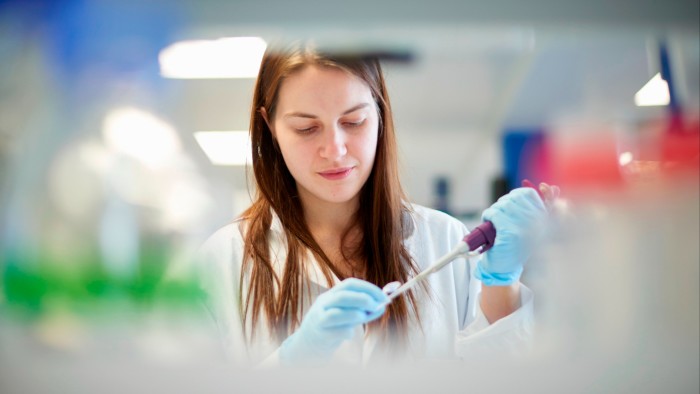Unlock the Editor’s Digest for free
Roula Khalaf, Editor of the FT, selects her favourite stories in this weekly newsletter.
The number of British companies listed among the global top 2,000 spenders on research and development almost halved in the 10 years to 2023, pointing to the challenges for the UK to “win the global race” on artificial intelligence.
Sixty-three UK companies were among the top 2,000 spenders on R&D globally in 2023, down from 70 in 2022 and 118 in 2013, according to data from the EU Industrial R&D Investment Scoreboard.
By comparison, the US had 681 companies, up from 668 a decade ago, and China registered 524, up from just 119 in 2013.
Britain’s share of global spending on R&D has declined steadily over the past decade, in line with a broader downward trend among most advanced economies excluding the US. The trend reflects China becoming a key rival to the US in R&D spending and innovations, including AI.
The figures relate to the level of R&D funded by companies, not all of which is carried out in the country in which the company is registered.
Prime Minister Sir Keir Starmer last week pledged to “move fast and take action to win the global race” on AI, which is at the forefront of innovation and has enjoyed a surge in investment around the world in recent years.
He described the fast-evolving technology as a “chance to turbocharge growth” — a core mission of his administration.
But Carlos López-Gómez, head of policy links at IfM Engage, a consultancy at the University of Cambridge, said the US and China were “way ahead of the UK” on AI and “we should worry about the fall in the number of UK companies among the top global R&D spenders”.
“We should also worry that despite the UK being a global leader in academic scientific research, the private sector is not as R&D-intensive,” he added.
Separate figures tracked by the OECD show that the cumulative amount of venture capital invested in AI start-ups between 2012 and 2023 totalled $427bn in the US and $232bn in China, but only $29.8bn in the UK.
Overall UK business investment, which is considered a key factor for innovation and productivity growth and of which R&D is a part, rose in the first three quarters of 2024, according to official figures.
But Britain has underperformed the US over the past decade following weak business investment growth since the Brexit referendum. The US lead in tech has been identified as a key factor in its faster productivity growth over Britain and the EU in the past 20 years.
The UK had only two companies, pharmaceutical groups AstraZeneca and GSK, in the top 100 R&D spenders in 2023, the latest year for which the EU scoreboard figures, published at the end of last month, are available.
With investment from 275 companies, software and computing services received the most financial backing of any sector among the top 2,000 R&D spenders in 2023. Of the 275 companies, 158 were from the US, 59 were Chinese and seven were from the UK.
López-Gómez said that while Britain ranked well in academic research output and top-performing universities, its scientific knowledge was “not translating into economic value”.
The country was at “risk of becoming the lab of the world, having all these new technologies” that would be scaled up in order to deliver high-paid jobs overseas, he added, as he called on ministers to “think not only on technology development but also adoption in a way that relates to business objectives”.
Nonetheless, experts have welcomed Starmer’s AI measures, which include increasing public compute capacity by twentyfold and creating a National Data Library.
Umang Paw, chief technology officer at advisory firm PwC UK, said the policies marked a “welcome step forward as the UK looks to grasp the huge opportunities that AI can provide to the country’s economy and public services”.
Paul Dales, chief UK economist at consultancy Capital Economics, said AI would “encourage investment and lead to much faster productivity growth” irrespective of where innovation occurred.
The UK’s strength in services meant it “was better placed to enjoy a bigger boost than most other major economies,” he said, adding that success would rest in part on the government “setting the right conditions and not regulating it [AI] too heavily”.
The government said it was “determined to unleash UK R&D as a driving force in our mission to grow the economy” and that Britain continued “to attract high levels of international investment”.
Read the full article here

